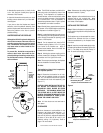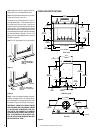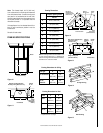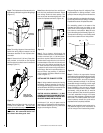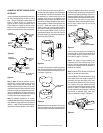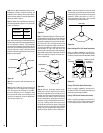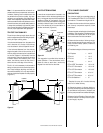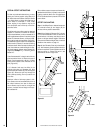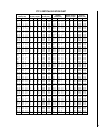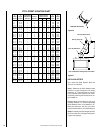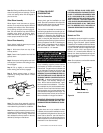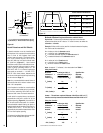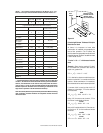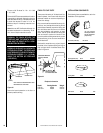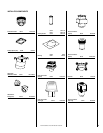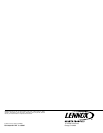Special offers from our partners!

Find Replacement BBQ Parts for 20,308 Models. Repair your BBQ today.

NOTE: DIAGRAMS & ILLUSTRATIONS NOT TO SCALE.
18
Storm Collar 63L59 FSC
Locking Band 63L60 FLB
Figure 44
FINISH TO YOUR TASTE
There are a wide variety of “finished looks” for
these fireplaces, from formal wall decor with
elaborate mantels to rustic wood paneling or
warm brick facings.
Only noncombustible materials like stone, tile,
brick, etc., may overlap the front facing. Do not
extend these materials beyond the facing and
into the firebox area. Be sure not to interfere
with the installation and operation of glass
doors. Seal all joints between the facing and
wall surrounds to prevent air intrusion. Use
noncombustible caulking material only to seal
the metal facing to the surround material on
the finished wall.
Combustible materials may project beyond
the sides of the fireplace opening as long as
they are kept within the shaded areas illus-
trated in
Figure 44
.
Air Inlet Kit (with duct) LB-101372
Firestop Spacer (30°) 63L37 F10FS30-2
INSTALLATION COMPONENTS
The following items are available for use in the
installation of this appliance.
Fireplace Information
Model Catalog Number Weight
LSO-43 H0303 270 lbs.
LSO-43-H H0304 270 lbs.
18"
(457mm)
45˚
Combustible Materials
Allowed in Shaded
Area
1"
(25mm)
18" (457mm)
Minimum Distance
to Protected Side Wall
(Air Inlet supplied
with fireplace. Shown
here for replacement
purposes only)
Figure 43
Secure the hearth extension to the floor to
prevent possible shifting.
Max. Thickness of Hearth Extension when
Oasis Models are on the Floor
5 ³⁄₄"
(147mm)
Do Not Block
Cleanout Panel
WARNING: THE CRACK BETWEEN THE
FIREPLACE AND THE HEARTH EXTEN-
SION MUST BE SEALED WITH A NON-
COMBUSTIBLE MATERIAL.
WARNING: WHEN INSTALLING HEARTH
EXTENSION IN FRONT, THE FIREPLACE
MUST BE RAISED IF HEIGHT OF HEARTH
EXTENSION EXCEEDS 5 ³⁄₄" (197MM)
ABOVE THE BOTTOM OF FIREPLACE
(
FIGURE 43
).
The sum of all “R values” is: .70 + .10 +. 038
+ .10 = .938
This would NOT be an acceptable combination
of material for the hearth extension since the
total calculated “R value” of the materials used
is under the required “R value” of 1.19. An
additional layer of insulating materials must
be used.
Note:
Also see NFI Certification Manuals for
expanded explanation on calculating “R val-
ues” when multiple materials are used.



